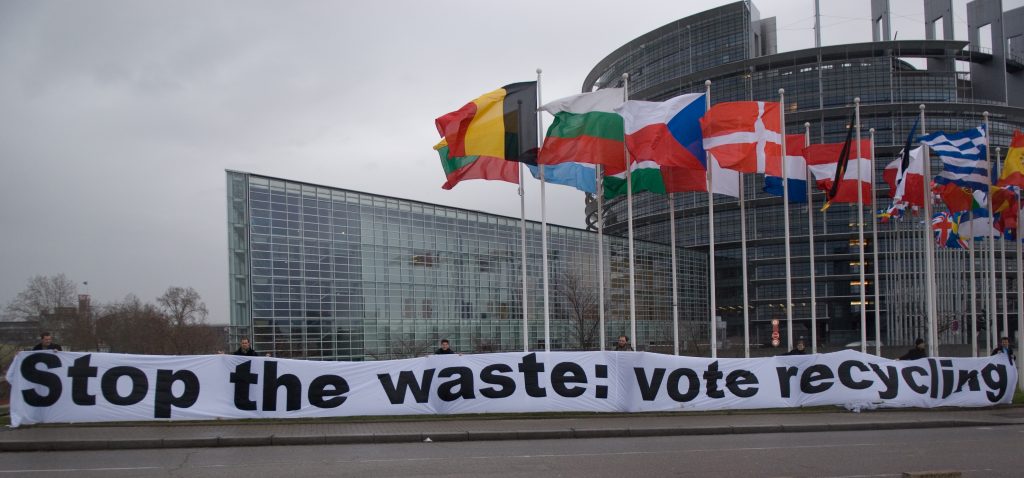Brussels, Tuesday June 27 – Environmental NGOs have criticised EU Environment Ministers for failing to address the controversial Commission proposal to reclassify municipal waste incinerators as ‘recovery facilities’ when they discussed EU Waste Strategy today. The redefinition risks boosting incineration at the expense of reduction and recycling of waste.
“By making burning of waste as acceptable as re-use or recycling, the reclassification of incinerators would be a major step back in EU waste policy and would undermine other positive elements adopted in the EU Waste Strategy today,” said Michael Warhurst, Waste Campaigner at Friends of the Earth Europe.
The Council Conclusions on the EU Waste Strategy (1), adopted today, include a number of welcome steps: support for a clear five-step hierarchy of waste management, giving priority to recycling over incineration in principle, emphasis on the importance of recycling law and targets, support for composting of biowaste, and establishment of indicators on waste prevention. But the Commission proposal to reclassify incinerators risks undermining all these good intentions.
Today’s Council Conclusions do not touch the ‘hot’ incineration issue and do not recognise the fact that various countries, including Poland, the Czech Republic, Hungary and Slovakia, have clearly expressed their opposition to the reclassification (2), restated at the meeting today.
“Incinerators are a disposal method, they should not be re-branded as recovery. They waste resources that could otherwise be saved through recycling, they discourage waste prevention, and a typical incinerator converting waste to electricity produces around 33% more fossil-fuel derived carbon dioxide than a gas fired power station,” Mr Warhurst added. (3)
Martin Konecny of CEE Bankwatch Network said, “In central and eastern Europe, the reclassification of incinerators could have particularly adverse effects. It could divert the use of millions of euros from the EU structural and cohesion funds from sorting and recycling schemes into building new incinerators. EU ministers must maintain the classification of incinerators as disposal. A short-term ‘fix’ by creating new restrictions for movements of waste will not be an effective solution.”
The status of incinerators will be definitively resolved in the upcoming negotiations on the Waste Framework Directive.
Stefan Scheuer, European Environmental Bureau Policy Unit Director said, “It is important that ministers now turn their support for a clear cut EU waste management hierarchy in today’s Council Conclusions into concrete action. This means that in the coming negotiations for a future EU waste law they must reject the Commission’s move to disguise municipal incinerators as ‘recovery installations‘.”
***
Notes:
(1) Council conclusions on the Thematic Strategy on the prevention and recycling of waste, seen by the NGOs in advance and adopted today
(2) A English version of the statement by the four environment ministers of Slovakia, Poland, Hungary and the Czech Republic expressing their reservations on the Commission’s proposal to reclassify municipal waste incinerators as recovery facilities can be found at
http://www.eeb.org/activities/waste/incineration/Visegrad-4-declaration-4-and-5-May2006.pdf
(3) For details see the report ‘A changing climate from energy from waste’ and the briefing ‘Dirty Truths: Incineration and Climate Change’, linked from:
http://www.foe.co.uk/resource/press_releases/green_incineration_claims_02052006.html
Also see the following position papers:
Friends of the Earth Europe: “Policymakers briefing – Creating a new waste policy: Promoting sustainability through innovation and efficient use of resources”, May 2006:
http://www.foeeurope.org/publications/2006/Waste_Briefing_May2006.pdf
European Environment Bureau: “EEB recommendations on the Commission Communication on the Thematic Strategy on Waste Prevention and Recycling and the associated Commission proposal to amend the Waste Framework Directive (COM (2005)667)”, June 2006:
http://www.eeb.org/activities/waste/EEB-Brief-Waste-Strategy-and-Directive-recommendations-050606-sum.pdf





